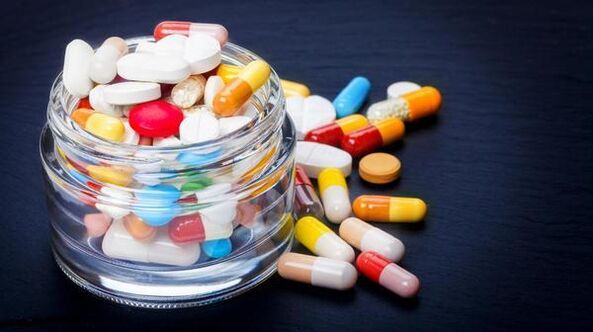
In the article, we collected all the prostatitis drugs prescribed by doctors as part of the treatment of acute and chronic inflammation of the prostate. You'll learn what they do, how to take them, how much they cost, and what side effects to worry about.
What are the drugs for treating prostatitis
The treatment of prostatitis is mainly based on antibiotics and anti-inflammatory drugs. As adjuvant therapy, immunomodulators, drugs for improving metabolic processes of the glands, antispasmodics are prescribed. Below we'll take a closer look at each group.
antibacterial
Antibiotics are needed in the treatment of bacterial prostatitis in order to quickly eliminate the infection in the prostate to avoid complications: migration of pathogens to the testes, transition of inflammation to a chronic form, development of prostatic abscesses and urosepsis.
Medications are chosen based on test results, but until cultures are ready, broad-spectrum antibiotics are prescribed. The most common pathogens are Escherichia coli, Enterococcus faecalis, Staphylococcus, Ureaplasma, and Chlamydia. They can only be eliminated with the help of antibiotics, which can penetrate into the glandular tissue and accumulate in it for a long time. Fluoroquinolones have these properties. The value of these drugs lies in their ability to penetrate the protective barrier synthesized by ureaplasma. Tetracycline is effective against chlamydia, coryneform bacteria, and staphylococcus. For trichomonal prostatitis, drugs based on the antiprotozoal substance metronidazole are prescribed.
Sometimes the drug is injected directly into the prostate. This is called lymphocyte therapy.
Antifungal
Fungal prostatitis is rare. Antifungal medications for inflammation of the prostate are often used to prevent candidiasis. After taking antibiotics for a course of treatment, the immunity is weakened, and the fungus actively reproduces, which may develop into candidal balanitis and balanoposthitis.
Anti-inflammatory (drug
Nonsteroidal anti-inflammatory drugs (NSAIDs) are used to treat acute prostatitis and chronic relapses. Pain from an inflamed prostate can travel to the lower back, legs, and rectum. NSAIDs block the release of substances that cause inflammation. To avoid side effects of the gastrointestinal tract and exacerbation of prostatitis, the drug is prescribed in the form of suppositories. Drugs are cheap, but not for long-term use.
Antispasmodics
An inflamed prostate swells and squeezes the urethra, making urination difficult and painful enough to cause muscle spasms. Antispasmodics relax the smooth muscle fibers of the prostate, urethra, and bladder neck, facilitating urination and defecation. These mildly inflammatory drugs can be an alternative to NSAIDs. In particular, the drotaverine substance is usually contained in the formulation and has no side effects.
alpha blockers
Alpha-blockers act similarly to antispasmodics, but more pronounced. They are also useful for poor urination. These drugs significantly reduce tension in the prostate, bladder wall, and neck. The urine stream becomes confident and uninterrupted, and the bladder is completely emptied. Alpha-blockers help avoid the accumulation of residual urine (in which bacteria actively multiply) and pathological changes in the bladder wall. A common side effect of these drugs is retrograde ejaculation.
painkiller
NSAIDs are successful in their prostatitis pain relief, but if they fail, analgesics are prescribed in injections.
diuretics
Prostatitis requires diuretic medication to flush the urethra, remove excess fluid and relieve swelling of the gland. Chemical drugs such as furosemide are rarely used, so as not to cause salt balance imbalance. Most doctors prefer herbal preparations.
sedative
Soothing, more precisely, antidepressants, are needed in chronic prostatitis to relieve neurotic and depressive symptoms caused by persistent pain, inability to empty the bladder normally. Doctors often prescribe SSRIs, but they can make erectile function worse.
enzyme
Preparations based on enzymes of animal and plant origin can dilute prostatic secretions, promote glandular drainage, and have analgesic and immunomodulatory effects. The most effective method of administration is intramuscular injection.
immunomodulator
Chronic prostatitis respectively reduces the local immunity of the prostate, so it is necessary to raise it above all. In this direction, formulations based on bovine prostatic peptides are effective. They restore metabolic processes in the glands, stimulate the activity of secretory epithelial cells. Normal Secret has antimicrobial properties, which also help relieve inflammation. The best form of preparation is in the form of candles.
Urologists often prescribe interferon-inducing agents as immunomodulatory therapy. Immunologists warn that such disruptions to the immune system should only be targeted after the immune map. The doctor must first figure out which link the fault is in and whether there is one.
Dietary Supplements
For the treatment and prevention of prostatitis, dietary supplements are prescribed on a natural basis. It is mainly an extract of rosewood, which is also creeping saw palmetto. The active substances block enzymes that cause inflammation and swelling, strengthen blood vessels and improve blood circulation in the pelvic area. With the process of taking the drug, the process of urination is facilitated.
in conclusion
remember:
- Prostatitis is a multifactorial disease and therefore needs to be treated with multiple drugs.
- Do not drink antibiotics and uremic agents before diagnosis, so as not to distort the results.
- In online pharmacies, many medicines are much cheaper than traditional medicines.






















